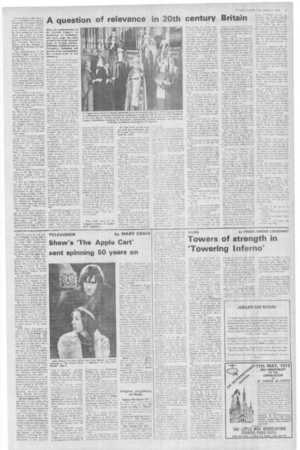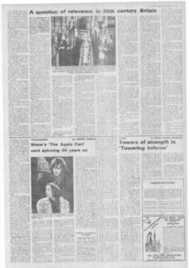Page 7, 31st January 1975
Page 7

Report an error
Noticed an error on this page?If you've noticed an error in this article please click here to report it.
Tags
Share
Related articles
June's
Will This English King Be
On With The Dance Of Man And Beast
University College, Dublin
Coronation Ritual And A Basic Truth
A question of relevance in 20th century Britain
Let me admit it right away: I have a weakness for national ceremonies. Eversincel danced round the maypole outside Pudsey baths for the coronation of our present monarch there has been something irresistible about the clatter of kingly hooves and the blowing of royal trumpets. I like the theatre too. But somehow Westminster Abbey and the Houses of Parliament seem more real than the Old Vic.
The enthronement of Dr Donald Coggan as the 10Ist Archbishop of Canterbury was by any standard a splendid affair. Perched on a platform of scaffolding near St Augustine's Chair I watched as he dignitaries made their solemn way from the great West Door to the quire: masters of livery companies swathed in fur, barons of the cinque ports in quite impractical scarlet cloaks, a hewigged Speaker from the House of Commons and a pride of Lord Mayors in full ceremonials.
Each section of the procession was preceded by a verger or marshal who, as one journalist said, really ought to have been carrying placards to announce who they were. It was a medieval beanfeast.
Then, at the appointed time, the West Door was closed for the arrival of the Archbishop himself. A hushed congregation heard him hammer three times and trumpets blew a fanfare as Dr Coggan stepped over the threshold to be welcomed by the Dean of Canterbury. The historic service of enthronement began.
It must have been the arrival on the scene of Messrs Wilson, Heath and Thorpe — after Canterbury City Council and before the diocesan deaconesses — that prompted in my mind a wicked thought. What, I found myself asking, has the presence of all these nobles and commoneis in a quiet country town 60 miles from London got to do with the hard facts of life in twentiethcentury Britain?
When we come down to brass Lacks is all this pomp and ceremony really, after all, relevant? And if so, to whom and why? •
I hope my Anglican friends will not think the question churlish or impudent. It could equally well he asked of ceremonies in the Vatican or even, whisper it softly, in Westminster Cathedral. It is a question which underlies much of our internecine disagreement over Liturgy since the Second Vatican Council: "What is the value of pomp?"
The ceremony at Canterbury had at least three functions. Primarily it was a religioua ser vice of dedication, in which a "frail man" — as Dr Coggan described himself — makes his commitment to God. It was a form of public relations exer With the enthronement of Dr Donaid Cogga.n as Archbishop of Canterbury one mots page has been turned in the multi-coloured book of English history: MICHAEL DUGGAN was in C?ntarbury Cathedral and new he takes a sympathetic but critical look at the ceremony.
cise, in which political leaders demonstrated their goodwill towards Christian values.
For the television viewer at home the enthronement service provided an opportunity to identify with the congregation. in the cathedral and to bask in a possibly spurious sense of "national unity." For many viewers the prayers and anthems may have satisfied a felt need to worship God.
But ceremonies of this kind are not without their dangers. The greatest risk is that the Church of Christ might be thought — however mistakenly to rub shoulders juat a little too enthusiastically with the political and economic powersthat-be. When one recalls the 13 deaths in Derry on Bloody Sunday -for which the British Government has still not officially admitted any guilt — that is not a pleasant thought.
A second danger is that the essentially feudal pageantry of the occasion could leave an impression that tile Church is totally out of touch with twentieth-century realities.
During the solemn processions — which appeared to take up as much time as the actual service — one looked in vain for official representatives of Britain's factory workers or trades unions. No doubt many ordinary people switched on their television sets to watch the ceremony. But how many switched them off to avoid watching it?
True, there were compensations. Best of all was the sight of four non-Anglican Church leaders, including our own Archbishop Cowderoy of Southwark, greeting Dr Coggan in the words: "Dearly beloved brother in Christ. we greet you in the name of the Lord and pray that your ministry may be abundantly blessed." The historic significance of this gesture, and of the presence of three Cardinals, was not lost on the handful of demonstrators waving anti-Papist banners outside.
Archbishop Coggan's sermon too hit just the right note of realism and confidence. The Church faced a time of tribulation, he said, and there should be no "whining" when it came. "The world desperately needs loving. and it svill have to
be done sacramentally by outward and visible signs of the inward grace of God's love." He added that one secretary had weitten, perhaps more wisely than she knew, not of his enthronement but his enthornment.
Outside the cathedral I met Fr Niels Rasmussen, a lecturer and one 'of only two Danishhorn Dominicans in Denmark. Fr Rasmussen had greatly enjoyed the ceremony. But for him too it raised many questions. Would it be possible, I wondered, to hold the next dedication ceremony in the slums of London or Belfast, so that the Church would be more clearly identified with the poor and dispossessed? Fr Rasmussen said the whole thing had been very English. A ceremony of that kind could not take place in Denmark. Young people would not stand for it.
On balance, though, we came to a tacit agreement that the service had probably done more good than harm. History has thrown up far more pernicious examples of national ceremony. And as Fr Rasmussen said: "After all. it was Christian."
The full text of Dr Coggan's sermon at Canterbury Cathedral Sr John 16.33: In the world you shall have tribulation. Rut be of good cheer, I have overcome the world.
I bid you look these words straight in the eye. What do you sec? I sec in them two thinks. — First, the realism of Jesus. "Tribulation" — He was on His way to the Cross. His followers would tread in the steps of the Crucified.
Secondly, the, confidence of Jesus, "Be of good cheer. I have overcome the world. The victory is Mine."
The touch of the Evangelist in recording these words is sure. Realism and confidence. Suffering and victory. Calvary and Easter. He got it right.
That picture comes to us from the first century. Let me take you from the first to the third. Listen to this from St C'yprian, writing to a man by the name of Donatus:
"This seems a cheerful world, Donatus, when I view it from this fair garden, under the shadow of these vines, But if I climbed some great mountain and looked out over the wide lands, you know very well what I would see.
"Brigands on the high road. pirates On the seas, in the tunpitheatres men murdered to please the applauding crowds, under all roofs misery and selfishness. It is really a had world, Donatus, an incredibly had world.
"Yet in the midst of it I have found a quiet and holy people. They have discovered a joy which is a thousand times better than any pleasure of this sinful life. They are despised and persecuted, but they care not. -f hes. have overcome the world. These people, Donates, are the Christians . . . and I am one of ,them."
Now let me take you from the third to the twentieth century, and to that last quarter of it in yk,hich we live and are caljed to bear our witness to our Lord. The parallels with the conditions of the first and third centuries are close — tribulation; 'violence; materialism which sh uts i Le eyes to extremities of %+:ealt'n and poverty existing side by side; abandonment of thc old gods and a pathetic inability to replace them with anything adequate for the needs of modern nein rear on every side; and because iniquity abounds, the love of many growing cold.
Under these conditions, what is the Church to say to the world in its fear, its agony and its wistfulness? I believe that the emphasis of Jesus as recorded by St John are preeisely those which are most iiseded today—.
realism and confidence. First. realism. Let the Church face the facts — and lace it unblinkered — that ii is in for a time of tribulation. If we arc
fools enough, for Christ's sake, to follow Him, then we roust face tribulation and even crucifixion — and no whining when that comes, no complaining when the winds are contrary. No crying to the world, for the sake of popularity, "peace, peace, when there is no peace"! No "heating of the wounds of My people lightly"! Our radical sickness calls for a radical cure — and that can only come by way of the Cross. Did that secretary write more wisely than she knew when, by an-error of typing, she referred to my enthornment instead of my enthronement'?
Secondly, confidence. When the Christian speaks of confidence, he does not mean a kifiel of starry-eyed optimism based on a theory of human progress and perfectability. Rather, he means hope based on the resurrection-victory of Jesus.
In recent years this confidence has been strangely lacking in certain parts of the Church. We have passed — and are still passing — through a period in which loss of nerve has marked too many of us. God knows the Church has enough, aid more than enough, to repent of.
But repentance is not a masochistic breast-beating which scarcely conceals a death-wish! Repentance rather is a positive thing, a life-attitude of turning one's hack on what is sinful and worthless, and turning one's face towards the living God.
It is time that we, said, unitedly and joyfully, tci all who will listen: "We are not interested in the possibility of defeat. Our confidence is in the risen Lord, who said 'On this rock I will build my Church and the gates of hell shall not prevail against it.' We know something of the power of the Holy Spirit. We are open to learn more of Him, "We • await the surprises of tomorrow. Crises? Yes — we see them all around us. We note that the word means judgement, and we can discern the judgement of God at svork in the history of our time. But for us Christians crisis also speaks of opportunity.
"Then, welcome each rebuff.
That turns earth's smoothness rough, Each sting that bids nor sit nor stand But go!
"In the power of the risen Christ arid with the stimulation of the Holy Spirit, we will go — in confidence and joy."
Against that background of realism and confidence, I touch on two matters — the first addressed primarily to the Church of England and the Anglican Communion (though it undoubtedly affects Churches beyond her bounds); the second addressed to all who name the Name of Christ.
First, one of the greatest needs of the Church at this moment is a steady increase in the number of those coming forward to ordination. Not for one moment must we lower the standard of those who apply for training, To .do so would he to court disaster. But for too long the numbers of those seeking ordination in the Church of England (as in other Churches) have been declining.
"Such a decline is like a haemorrhage in the human body. Recently we have seen a change. an upturn in the numbers. This will need to increase. and to continue to increase over a long period, if we are to make up losses and right our manpower situation.
Let us engage in experiments in forms of ministry. I.et us train auxiliary clergy. But let us not delude ourselves into thinking that this will solve our problems. It will not.
We must have a steady supply of parish priests who will give themselves wholly to this one thing — the thoughtful ministry of the Word, the awesome ministry of the Sacraments, the visiting of the homes of the people, the ceaseless ministry of intercession, the equipping of the laity for their witness.
Let us say to our young men today: "There is no finer life than that of a parish priest. Covet this calling. Train for it. Pour your best into it. Glory in it. Count yourself thrice-blessed if you hear God calling you to Of course, we shall have to pay for the training and maintenance of these men. We can no longer rely on dead men's money — nor toy with stewardship — nor fail to tithe our income in a business-like fashion. The truth is that when confidence revives, and love of God waxes warm, and faith burns bright, financial problems have a strange way of solving themselves,
Why do I, on such an occasion as this, fasten on the need for recruits to the ordained ministry? I do so because I believe in the ministry of the laity. if that sounds paradoxical, even contradictory, I can only say that the main work of Christ's Church will be done by the witness of the faithful laity. But if that witness is to be intelligent and infectious, it will demand an adequate supply of full-time, well-equipped, highly
• qualified clergy whose primary task will be to train the frontline troops for their warfare. Secondly. my second word is addressed to all who name the Name of Christ. It can be summed up in one simple sentence: "We must. grow till our arms get right round the world." When you put your arms round somebody. you tell him that you love him. It is a sacramental act. The world desperately needs loving, and it will have to be done sacramentally by outward and visible signs of the inward grace of God's love.
Such an embrace will be costly. It will involve the abandonment of much that we have hitherto taken for granted. Our divisions will have to go — and this week of Christian unity reminds us to ask ourselves how we can preach. reconciliation if we ourselves are not wholly reconciled?
Our possessions will have to go. including many of those buildings of small historic value which do little more than consume our money and • our energies.
Our selfishness will have to go, for much of the global village in which we live is deprived of those necessities without which no human being can fully live — food, literacy. education. freedom, knowledge of the Christian way. Round such deprived millions our arms must go, and for that we must grow. Our most powerful arms will be the arms of prayer.
It is significant that the man who spoke those words "We must grow till our arms get right round the world" was General Booth of the Selvation Army. He was a man like Pope John, whose arms were stretched out wide to embrace the world — and a very costly stretching it was.
But these two men, so different from one another in so many ways — were at one in this, that they were disciples of One whose arms were stretched out wide, on a cross, and whose hands were pierced, pierced by and pierced for the sin of the world. "By whose stripes we are healed."
Let me recapitulate, very .briefly, for 1 want these words • to reach your hearts, to remain in your minds, to nerve your wills and to ring round the world.
The realism of Jesus — "in the world you shall have tribulation". The Church militant expects wounds, for it follows a wounded Lord.
"The confidence of Jesus —"I have overcome the world." We are on the victors side of Calvary. We are children of the Resurrection, We are sons of the holy Spirit.
So:— Forth in the peace of Christ we go; Christ to the world with joy we bring: Christ in our minds. Christ on our lips,
Christ in our hearts, the world's true King.
blog comments powered by Disqus











